Unit 2: Remote control
Nhằm đáp ứng yêu cầu sử dụng anh ngữ trong lĩnh vực điện, bài học này giúp cho người học có kiến thức và kỹ năng về anh ngữ để đọc và hiểu được các bước lắp đặt và đi dây cáp, kiểm tra và vận hành thử các thiết bị điện đồng thời cung cấp cho người học vốn thuật ngữ tiếng Anh chuyên ngành để người học có thể sử dụng trong môi trường làm việc tại doanh nghiệp nước ngoài và đọc các tài liệu tham khảo chuyên ngành điện bằng tiếng Anh.
Mục tiêu của bài học:
Sau khi học xong bài học này, sinh viên có khả năng sử dụng kiến thức và kỹ năng anh ngữ:
- Đọc hiểu được các từ trong phương pháp lắp đặt thiết bị điện, cụ thể là cáp đồng trục và quy trình cơ bản lắp đặt bằng tiếng anh
- Hiểu các từ vựng và phát âm chính xác các thuật ngữ chuyên ngành về các khí cụ điện dùng trong lắp đặt và quy trình lắp đặt cáp bằng tiếng anh
- Ứng dụng thì hiện tại tiếp diễn để giao tiếp trong thực tế
- Tự tin giao tiếp trong môi trường doanh nghiệp
Có thể bạn quan tâm!
-
 Tiếng Anh chuyên ngành Nghề Điện tử công nghiệp - CĐ Công nghiệp và Thương mại - 1
Tiếng Anh chuyên ngành Nghề Điện tử công nghiệp - CĐ Công nghiệp và Thương mại - 1 -
 Tiếng Anh chuyên ngành Nghề Điện tử công nghiệp - CĐ Công nghiệp và Thương mại - 2
Tiếng Anh chuyên ngành Nghề Điện tử công nghiệp - CĐ Công nghiệp và Thương mại - 2 -
 Tiếng Anh chuyên ngành Nghề Điện tử công nghiệp - CĐ Công nghiệp và Thương mại - 4
Tiếng Anh chuyên ngành Nghề Điện tử công nghiệp - CĐ Công nghiệp và Thương mại - 4 -
 Tiếng Anh chuyên ngành Nghề Điện tử công nghiệp - CĐ Công nghiệp và Thương mại - 5
Tiếng Anh chuyên ngành Nghề Điện tử công nghiệp - CĐ Công nghiệp và Thương mại - 5 -
 Tiếng Anh chuyên ngành Nghề Điện tử công nghiệp - CĐ Công nghiệp và Thương mại - 6
Tiếng Anh chuyên ngành Nghề Điện tử công nghiệp - CĐ Công nghiệp và Thương mại - 6
Xem toàn bộ 134 trang tài liệu này.
Nội dung của bài học:
I. VOCABULARY
Mục tiêu: Cung cấp cho người học các từ vựng bằng tiếng anh trong lĩnh vực lắp đặt thiết điện, cáp điện để người học có thể đọc và hiểu được từ chuyên môn liên quan đến một số tài liệu trong lĩnh vực điện điện tử công nghiệp bằng tiếng anh.
Rule (n) Installation (n) Regulation (n) Recognize (v) Body (n) Constraint (n) Procedure (n) Conformity (n) Comply (v) Coax (n) Tuner (n)
High definition (n) Antenna (n) Receiver (n)
DTV (n)
: Quy tắc
: Cách lắp đặt
: Quy định
: Nhận biết
: Cơ quan
: Giới hạn
: Quy trình
: Sự tuân thủ
: Tuân theo
: Cáp đồng trục
: Bộ phận dò sóng
: Độ phân giải cao
: Ăng ten
: Máy thu
: Digital TV
Clamp (n) Route (v) Staple (n) Rooftop (adj) Closet (n) Affix (v)
Off air Mount (v) Snug bolt (n) Finger tight Satellite (n) Diplexer (n)
Alternativel (a) Wrench (n) Voltmeter (n)
: Cái kìm
: Định vị
: Đinh móc U
: Trên mái
: Buồng, kho
: Gắn vào
: Mặt đất
: Thiết lập
: Tai bulong
: Vặn tay
: Vệ tinh
: Bộ phối hợp
: Tương tự
: Cờ lê
: Vôn kế
Ground block (n) Permissible (adj) Screw (n)
Bus bar (n) Cable tray (n) Support Substation (n) Transformer (n) Overload (n) Circuit (n) Screwdriver (n) Bolt (n)
Nut (n) Coil (n)
Put the plug in(v) Shock (v)
to use; to employ (v) Electric energy (n)
II. GRAMMAR
: Ròng rọc đáy
: Có thể
: Đinh vít
: Thanh cái
: Máng cáp
: Giá đỡ
: Trạm điện
: Máy biến thế
: Quá tải
: Mạch điện
: Cái tua vít
: Bu lông
: Đai ốc
: Cuộn dây
: Cắm phích vào
: Giật điện
: Sử dụng
: Điện năng
Probe (n) Shielding (n) Stud (n) Fuse (v)
Switch on/off (v)
Turn on/off (v) Transformer (n) Transformation of electricity (n) Alternating Current (n)
High voltage (n) Low voltage (n) Backward (adv) Nowadays (adv) by; due to ...;
because of ... ; out of as; since;
: Đầu dò
: Lớp chắn
: Mũ đinh, chốt
: Cầu chì
: Công tắc Mở/ đóng
: Mở/ đóng
: Máy biến thế
: Sự biến đổi điện năng
: Xoay chiều
: Dòng điện Cao áp
: Hạ áp
: Ngược lại
: Ngày nay Bởi vì, do
Mục tiêu: Cung cấp cho người học cấu trúc ngữ pháp về thì hiện tại tiếp diễn để người học có thể sử dụng trong quá trình viết hoặc giao tiếp trong công việc tại nơi làm việc hoặc trong đồi sống hằng ngày có liên quan.
2.1 The Present Continuous Tense
The Present Continuous Tense
a. Structure
The present continuous describes an action that takes place in the present and is still going on in the present.
* Declarative Sentences
Subject + Auxiliary verb + Verb + ing
e.g. I/A dog etc. am/is / are e.g. working/going/making
Example:
I am reading a book.
They are swimming in the sea.
* Negative Sentences
Subject
e.g. I/A dog
+ Auxiliary verb + not +
am/is/ are + not
Verb + ing
e.g.
etc. working/going/making
Examples
He is not joking
We aren't waiting for my uncle
*Questions
Auxiliary verb
Am / Is / Are
+Subject
e.g. I/A dog
+ Verb + ing
e.g. working/going/making
Examples:
Is she eating my cake now?
Are they having the party on Friday or Saturday?
b. Use
We most often use the Present Continuous when we talk about something which is happening at the time of speaking (now, at the moment):
Examples:
Pamela is sleeping in the bedroom.
The telephone is ringing!
Present Continuous is also used to express current trends:
Examples:
Fuel prices are rising constantly because of strong demand.
On-line shopping is growing rapidly nowdays.
Sometimes we use the Present Continuous to describe a planned action in the near future:
Examples:
I'm leaving for Vienna tomorrow morning.
We are having lunch at 12.30 o'clock
2.2 Exercises
1. Put the correct verbs
1. It …………….(to rain) right now.
2. I……………..(to play)football on Saturdays.
3. They ……………(to play)football every Tuesday.
4. She ………………..(to learn) English at school (2 hours a week).
5. My girl friend………………..(to cook)in the kitchen now.
6. Maggy………………(to cook) for her grandmother on Sundays.
7. Billy ……………… (to love)Mary.
8. Billy and I ……………..(to like)Chinese food.
9. Billy's father……………….(to jog)in the park today.
10. Nicholas……………………(to read)a fantastic book, keep silent !
11. Erik and Beth ……………….(to want) to go outside.
12. He ……………….(to play)on his computer this afternoon.
13. We ……………………(to eat) chicken wings at the moment: he is very hungry.
14. What………………………….(you /do) ?I'm sleeping.
2. Write the correct sentences
a. Earn/work/hard/ money/they/to.
→…………………………………………………………………………
b. The/to /actor/become a/I / professional /train
→…………………………………………………………………………
c. Pass/ study/to/ hard /exam/ the/Luke
→…………………………………………………………………………
d. Look/they/their/for/in/now/mother/the/hospital
→………………………………………………………………………….
e. a/she/find/job/good?
→…………………………………………………………………………
f. My/i/ sister/on /the/phone/my/talk/father
→…………………………………………………………………………
g. Time/ a/to/spend/they/lot/learn/of/English
→………………………………………………………………………….
h. Write/I /to/letter/my/parents
→…………………………………………………………………………
i. Me/my/continually /talk/boss/to
→…………………………………………………………………………
j. Live/brother/at/city/work/and/hue
→………………………………………………………………………….
III. CONTENT
Mục tiêu: Hình thành kiến thức và kỹ đọc hiểu cho người học để người học có thể đọc được một số tài liệu liên quan đến lắp đặt cáp đồng trục bằng tiếng Anh.
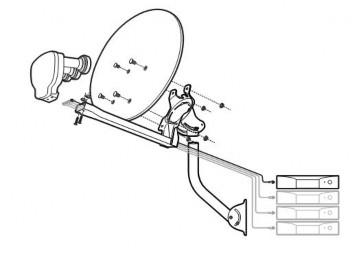
A. General rules for installation
In most countries, electrical installations shall comply with more than one set of regulations, issued by National Authorities or by recognized private bodies. It is essential to take into account these local constraints before starting the design. In so far as control procedures are respected, quality and safety will be assured only if:
The initial checking of conformity of the electrical installation with the standard and regulation has been achieved.
The electrical equipment comply with standards
![]()
The periodic checking of the installation recommended by the equipment manufacturer is respected.
B. Equipment used to install:
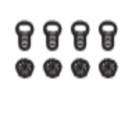
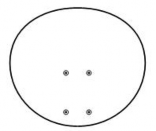
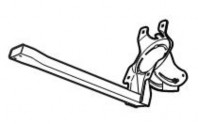
Multi-Satellite Dish Reflector
Dish Mounting Hardware
LNB Arm/Antenna Back Assembly

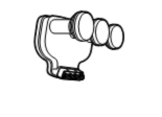
Triple-head, Multi-Satellite LNB with built-in Multi- Switch for four Independent Outputs
LNB Mounting Hardware

Grounding Screw
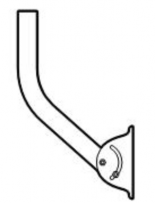
EZALIGN™ Mast
![]()


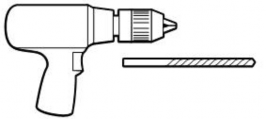
7/16” Nut Driver Adjustable Wrench Screwdriver (Phillips)
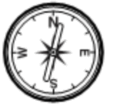
Magnetic Compass Electric Drill and Bit
C. Steps to install
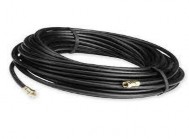
Select a quality RG6 (coax) cable for installation between the dish and each tuner.
Since most Direct TV (DTV) DVRs and TiVOs have dual tuners, consider running two cables instead of just one. In the case of the DTV High Definition DVR or DTV High Definition TiVO, consider three cables if you wish to connect an “off air” antenna to receive local channels that are not available from DTV. If DVRs are not planned, installing one cable will supply a simple DTV receiver.
Sat C, 110° with Converted Transponders
# 8, #10, #12
Sat A, 101°
withTranspond ers # 1 to # 32
Sat B, 119° with Transponders
# 22 to # 32
22
No trees, leaves, buildings can be in the line-of-sight between antenna and satellites.
Install a ground block in a convenient location anywhere between the dish and prior to entering the home. It is permissible to locate the ground block inside the home, but it should be as close to the point of entry as possible. If unable to purchase a ground block to accept all inputs and outputs, it will be required to add additional ground blocks as needed to accommodate all the connections.
To Receiver
Dual grounding block, one receiver hook up shown
Cable Grounding Block
Water Drip Loop
To Antenna
Install a #10 copper wire between the house ground point (ground rod, electric meter, etc.) and the grounding terminal screw of the new ground block. These two
points must be connected together. Use a clamp designed for the purpose to connect the #10 wire to the house’s ground point. Do not under any circumstances disconnect or loosen existing ground connections to install the new #10 wire. Leave enough ground wire to “thread” through each ground block(s) ground terminal. Route the cable and secure with staples to the mounting surface. Securely tighten the ground terminal screw to the ground wire.
Run coax cables from each of the dish's output terminals into one side of the ground block.
Run a cable from any rooftop UHF/VHF/FM antenna (if desired) to the same side of the ground block as the dish coax.
Run the same number of cables that were run into the ground block, between the ground block and a central location. A utility closet, a point near the telephone distribution block or electrical panel area is ideal. Label the coax cables “dish” or other meaningful manner. Be sure to label the coax from a roof top antenna if extended from the ground block.
Run cables from each tuner to the central location. Affix labels to each of the cables - if two cables are connected to a single set top box, such as the case for a TiVO or DVR in a living room, label the cables “LR1” and the other “LR2” or some other meaningful term.
Select a multiswitch by determining how many inputs and outputs are needed. The number of inputs equals the number of LNBs on the dish plus one. A dual LNB dish would require a three input multiswitch. The extra input is to mix in an “off air” antenna or CATV signal. The number of outputs of the multiswitch equals the number of tuners (not the number of receivers or set top boxes) in your system. A system of three set top boxes consisting of two DTV receivers and a DTV DVR or TiVO with two tuners would require a four output multiswitch. Of course, if you add another receiver later, you'll need a multiswitch that has additional outputs. Try to buy a multiswitch with enough extra outputs to allow your system to “grow”. Cascadable multiswitches can be installed “down line” from other multiswitches, but must be identified for that use.
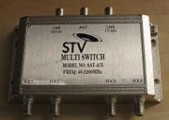
A “3X4” Multiswitch. It has two LNB (dish) inputs, a single ANT (antenna or cable) input and four RXn (receiver) outputs. Three inputs and four outputs - hence 3X4.





